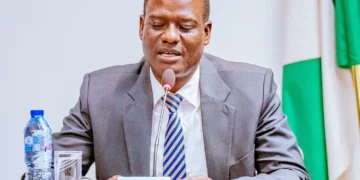Africa must urgently build and fortify resilient institutions to navigate a world increasingly shaped by fragmentation, trade protectionism, and geopolitical uncertainty, leaders and stakeholders declared on Wednesday at the 32nd Annual Meetings of the African Export-Import Bank (Afreximbank) in Abuja.
Themed “Building the Future on Decades of Resilience,” the gathering brought together heads of government, central bankers, development financiers, and private sector leaders to chart a bold path forward for Africa’s economic transformation, unity, and self-reliance.
Vice President Kashim Shettima emphasised that the continent must go beyond survival to full renewal. He highlighted Nigeria’s sweeping economic reforms — notably the unification of its foreign exchange market — as part of efforts to restore transparency and rebuild investor confidence.
“Resilience is not passive; it must be planned, built, and protected,” Shettima who was represented by Presidential aid Tope Fasua said. “We must now mobilize blended finance to crowd in private capital for infrastructure and green transition, deepen regional value chains powered by scalable industrial policies, and institutionalise digital trade systems to cut costs and boost intra-African commerce.”
Reaffirming Nigeria’s leadership role, Shettima pledged unwavering support for Afreximbank’s evolving mandate, particularly its efforts to drive inclusive growth by empowering women, youth, and small enterprises. “Nigeria stands ready — ready to lead, to collaborate, and to deliver,” he said.
Echoing this vision, Central Bank of Nigeria Governor, Olayemi Cardoso, applauded Afreximbank’s rise from modest beginnings with $750 million in capital to an asset base exceeding $40 billion today.
He described the bank as a “symbol of African financial fortitude” and a pivotal institution in shaping a new era of economic independence.
“To secure the future we envision, we must foster greater strategic cohesion among African states, accelerate the implementation of the AfCFTA, and build strong linkages with the African diaspora,” Cardoso said. He added that emerging initiatives aimed at attracting diaspora investment into Nigeria’s financial markets could unlock major development potential.
“The time has come to not just dream big, but to deliver big,” he stressed, calling on African governments to build the resilient institutions their people and economies urgently need.”
In a keynote address, Afreximbank President and Chairman of the Board of Directors, Professor Benedict Oramah, described the Bank’s journey over the last three decades as one of “defiance against doubt.” He praised Nigeria’s consistent backing, especially in responding to capital calls and removing regulatory barriers.
“Since 1993, we have mobilised over $250 billion into Africa, served as a lifeline during crises — from COVID-19 to commodity shocks — and empowered industries neglected by conventional financiers,” Oramah said.
Acknowledging the challenges of deglobalisation, rising nationalism, and economic fragmentation, he called for an unapologetically African roadmap to development, driven by intra-African trade, industrialisation, and innovation. “This is a time to build strength from within and shape a future that is proudly African and globally impactful,” he said.
Nigeria’s minister of Finance and Coordinating Minister of the Economy, Wale Edun, underlined the significance of Nigeria hosting this year’s meetings, saying it reflected the country’s enduring commitment to pan-African progress and institutional empowerment.
“We are at a pivotal moment in Africa’s journey. The theme of resilience could not be more timely,” Edun said. “In an increasingly fragmented and protectionist world, our collective strength must be rooted in cooperation, partnership, and economic sovereignty.”
He commended Afreximbank’s transformative role in Africa’s economic architecture, from export development and industrial finance to enabling intra-African trade, especially under the leadership of Prof. Oramah.
Participants at the high-level event agreed that as global dynamics shift and multilateralism faces headwinds, Africa must deepen its continental cooperation, embrace bold reforms, and place inclusive development at the centre of its transformation efforts.
The annual meetings continue through the week, featuring dialogues among policymakers, the private sector, development institutions, and academia — all united in exploring strategies for Africa to assert greater control over its destiny and build systems capable of withstanding external shocks.
As Africa stands at the crossroads of uncertainty and opportunity, all of the speakers agree that the time to build the resilient institutions of tomorrow is now.





